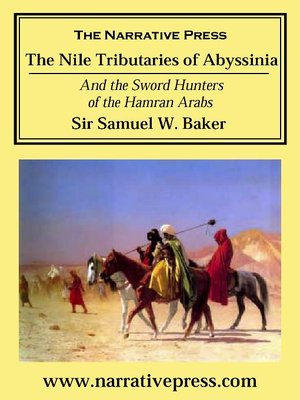The Nile Tributaries of Abyssinia
ebook ∣ And the Sword Hunters of the Hamran Arabs
By Sir Samuel W. Baker

Sign up to save your library
With an OverDrive account, you can save your favorite libraries for at-a-glance information about availability. Find out more about OverDrive accounts.
Find this title in Libby, the library reading app by OverDrive.



Search for a digital library with this title
Title found at these libraries:
| Library Name | Distance |
|---|---|
| Loading... |
"This being a concise summary of the Nile system, I shall describe twelve months' exploration, during which I examined every individual river that is tributary to the Nile from Abyssinia, including the Atbara, Settite, Royan, Salaam, Angrab, Rahad, Dinder, and the Blue Nile."
Sir Samuel Baker, who had spent a number of years in Ceylon in the mid-19th century was eager to explore new territories. The source of the Nile was still a great mystery in the 1800's. European speculation about Africa had long existed: ancient authors like Herodotus and Strabo wrote about it, and British schoolboys grew up wildly excited and eager to go there from reading these authors. David Livingstone, Richard Burton, John Speke, and Samuel Baker, among others, would base their expeditions partially upon these ancient texts. (Now aren't you sorry that you didn't learn Latin?)
Baker's earlier travels through Africa had led him to the lake that he named after Prince Albert. Now he was back in Africa to continue not only his exploration of the Nile and its tributaries, but also for ethnographic research, and hunting. Well, actually for hunting along the Nile tributaries.
He spent many hours with the Arabs of the region, and the book is full of his trenchant observations about their customs. He was especially thrilled when he found the Harman sword hunters, for he had heard of their skill in elephant hunting by sword alone. Here is his description of that important weapon:
"The Arabs are extremely proud of a good sword, and a blade of great value is carefully handed down through many generations. The sheiks and principal people wear silver-hilted swords. The scabbards are usually formed of two thin strips of elastic but soft wood, covered with leather. No Arab would accept a metal scabbard, as it would destroy the keen edge of his weapon."
Baker crossed deserts littered with camel skeletons, camped along riverbeds near hippopotami, and hunted the numerous animals of the Nile basin. From desert nomads he learned how Arab women perfume themselves, and from conversation with sheiks he learned the histories of the various tribes. And oh for the resourcefulness of the traveler:
"This day a herd of twenty-eight giraffes tantalized me by descending a short distance below the level flats, and I was tempted at all hazards across the river. Accordingly preparations were immediately made for a start. The sheik of the village and several of the Arabs were hippopotami hunters by profession; these fellows could swim like otters, and, despite the crocodiles, they seemed as much at home in the water as on land. We prepared an impromptu raft. My angarep (bedstead) was quickly inverted; six water-skins were inflated, and lashed, three on either side. A shallow packing-case, lined with tin, containing my gun, was fastened in the centre of the angarep, and two tow-lines were attached to the front part of the raft, by which swimmers were to draw it across the river. Two men were to hang on behind, and, if possible, keep it straight in the rapid current."
Baker does describe the Nile tributaries but the majority of his time seems to be taken up with his hunting: wild game and people are just more interesting to him. Yes, he can be pompous, but the world has shrunk since Baker's day, and his book captures all the excitement of being in new territory. And if you also need to know how to ford a swift river with a horse, you will find the technique in chapter 15.







